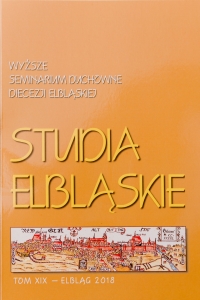Wpływ księży dekanatu sztumskiego na proces utrwalania polskości i katolicyzmu na terenie Powiśla w latach 1919 – 1920
The influence of the Sztum Decanate priests on the process of consolidation of Polishness and Catholicism in the Powiśle region in 1919 – 1920
Author(s): Jan WiśniewskiSubject(s): History of Church(es), Local History / Microhistory, Political history
Published by: Wyższe Seminarium Duchowne Diecezji Elbląskiej w Elblągu
Keywords: Plebiscite; Region of Sztum; Polish Catholics; pro-Polish priests
Summary/Abstract: The Sztum Decanate belonged, by the decision of the Treaty of Versailles of 28 June 1919, to the District of Kwidzyn. The Poles who resided here, following the lost Plebiscite, falling victim to terror, reached out for help to the Prime Minister of the Polish Government Wincenty Witos but he responded to them: “Those who are Polish, will come back to Poland. We will not go to war with the Germans for those few Poles”. The Poles in the Powiśle region established more informed and close communities than in other Polish regions of the Diocese. In particular, in the central part of the Sztum Decanate in the parishes of Postolin Straszewo, Stary Targ and Tychnowy. Some meritorious priests who consolidated Polishness shepherded those communities: 2 of them died in the Nazi era in the concentration camp in Sachsenhausen – the Blessed Fr. Władysław Demski and Fr. Bronisław Sochaczewski, and 4 other actively joined the Plebiscite work in favour of Poland: Fr. P. Mateblowski, Fr. F. Prus, Fr. S. Rosenau, Fr. F. Połomski, Fr. G. v. Palmowski; Fr. E. Gross. Those 8 priests distinguished themselves with zealous work among Polish parishioners, and the other 11priests did not leave any distinctive “marks” in favour of the Polish Catholic religious practices but neither did they take up any pro-German actions in their work, although they followed the instructions of the Frombork Bishop Curia. This engagement of priests in the “Polish” ministry translated effectively into a high percentage of pro- Poland vote in the Plebiscite.
Journal: Studia Elbląskie
- Issue Year: 2018
- Issue No: 19
- Page Range: 107-118
- Page Count: 12
- Language: Polish

